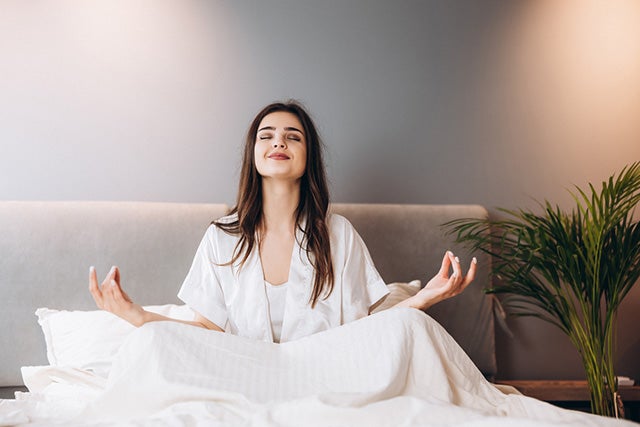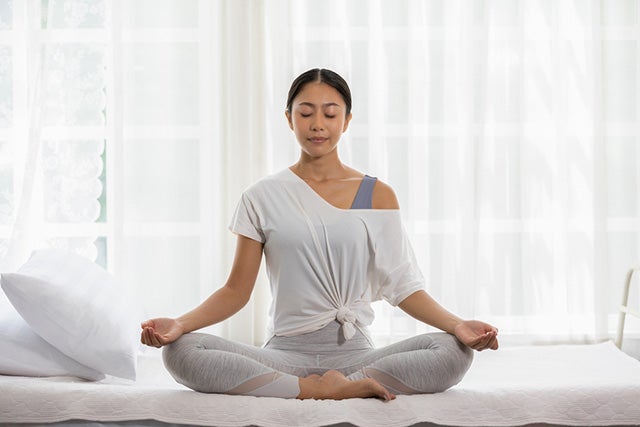Do you have trouble falling asleep? Do you lay in bed, worrying about the day ahead? Then you need to learn how to trick your mind and body into falling asleep. One great trick is to practice 4-7-8 breathing. If you’re not sure what that is, how it works, or how it helps you sleep, keep reading to find out!
What Is 4-7-8 Breathing?
Dr. Andrew Weil, a Harvard-trained physician and founder of the Arizona Center for Integrative Medicine, developed 4-7-8 breathing as a technique for deep relaxation.
Numerous people utilize this counting technique to help them cope with stress and anxiety via controlled breathing. It entails inhaling for four counts, holding your breath for seven counts, then exhaling for eight counts.
You might be interested to this: Why Are Some People Light Sleepers?
How Does It Work, Exactly?
Deep breaths, such as those employed in the 4-7-8 technique, are beneficial for anxiety reduction because they strengthen the link between the mind and body. As you slow your breathing and concentrate completely on each breath, your parasympathetic nervous system becomes activated.
As a result, your body is overwhelmed with relaxation. As your body collapses, your mind — compelled to concentrate on the mechanics of the breath — may detach from typical worries.
When it comes to holistically managing stress and anxiety, the 4-7-8 breathing is difficult to surpass. This is one of the more effective breathing exercises for this purpose.
The 4-7-8 approach divides your breathing practice into three phases. By doing so, you’re forcing your body and mind to regulate your breathing pattern.
All that is required is a mental count of the three phases and some breath training. Make sure you’re sitting upright as you’re practicing this breathing exercise.
How to Master 4-7-8 Breathing
4-7-8 breathing can be practiced at often as you like, regardless of where you are or what time of day it is. When you initially begin, make sure you practice twice per day, but you can practice as frequently as you like. At first, only perform four cycles in a row.
Once you’re comfortable with it, you can increase the number (people do it in segments of up to eight cycles). You may initially feel lightheaded, but this is a feeling that usually passes the more your practice.
- Locate a comfortable seat that will keep your back in a straight position.
- Keep your tongue on the rear of your top teeth.
- Completely exhale from your mouth, circling your tongue with a whoosh sound. If you have to, purse your lips.
- With your lips closed, inhale through the nose while you count to four.
- Count to seven while holding your breath.
- For a count of eight, thoroughly exhale through your mouth, generating a whoosh sound.
- Repeat the entire process at least three more times.
At any moment you feel pressured, practice 4-7-8 breathing. It will gain strength as you utilize it. Do it before responding to an emotional event and whenever you have trouble sleeping.
Can 4-7-8 Breathing Help You Sleep Better?
Practices of mindful breathing can induce a relaxation response. You have a built-in stress reaction that was created to assist you in avoiding risky circumstances.
While this fight-or-flight reaction may help you survive, it can have a detrimental effect on your health if it is triggered excessively in response to ordinary pressures.
The stress response weakens the immune system and may result in further health problems such as anxiety, depression, and high blood pressure. The relaxation reaction provides a profound sense of rest in the midst of this stress response. Additional advantages may include the following:
One of the unpleasant consequences of stress is difficulty sleeping. If your body feels too stressed out, falling asleep can be nearly impossible. By utilizing slow, deep breathing techniques, you can activate your body’s relaxation response and aid in sleep.
Other Benefits of 4-7-8 Breathing
Improved sleep is just one of the benefits of 4-7-8 breathing, so let’s take a look at some of the other perks.
• Better Concentration
An eight-week study published in 2017 studied the influence of deep, slow belly breathing on concentration, stress levels, and emotions. Following training, participants in the deep breathing group performed better on concentration tests and didn’t experience that many negative emotions.
• Lower Stress Levels
Slow abdominal breathing, according to the American Institute of Stress, can assist in alleviating stress by reducing your blood pressure and toning down your heart rate. Additionally, it aids in relaxing tense muscles and increases oxygen intake, two factors that contribute to relaxation.
• Reduced Pain
In a study that involved 16 healthy adults, it was discovered that those who exercised relaxed deep breathing felt less discomfort.
This was compared to those who performed deep breathing that needed a great deal of sustained focus. Both groups reported decreased levels of anxiety, anger, and depression.
Are There Downsides to 4-7-8 Breathing?
While there are other ways to practice 4-7-8 breathing, you should examine whether a method other than the one provided here works better for you.
The primary disadvantage of a breathing technique such as 4-7-8 breathing is that individuals frequently forget to practice. A brand-new habit takes roughly 30 days to develop, so patience is key until this technique becomes a natural part of your daily routine.
Is the 4-7-8 Technique Good for Everyone?
While individuals with specific medical conditions should always check their physicians before beginning any breathing exercise, this breathing technique was developed to be universally beneficial.
Simply remember to begin with four rounds of the 4-7-8 cycle at a time, as extended regulated breathing can occasionally create dizziness. Simply follow the following recommendations, and you’ll find almost immediately that managing anxiety and remaining calm becomes easier.
Suppose you practice this technique twice a day, every day. In that case, you should feel practically immediate benefits: a slower heart rate, less stiff posture, less difficulty regulating anxiety, and a clearer mind, to mention a few.
Maintain it for approximately six weeks, and you’ll begin to experience even more substantial benefits, such as improved sleep and lower blood pressure.
You might want to read this: Easy 12-Step Ritual to a Better Sleep
Final Words
The 4-7-8 breathing technique discussed in this article may help alleviate some of the symptoms of stress that are keeping you down. Additionally, it may provide other benefits, such as enhanced sleep quality.
If you’re looking for something simple to do that can have an impact on your life, this straightforward strategy may be just what you need. And for more great information on sleeping and stress, check out our guide to weighted blankets.
Photo credit: Anatoliy Karlyuk/Shutterstock;
220 Selfmade studio/Shutterstock; Ivan Dudka/Shutterstock;
fizkes/Shutterstock; Dean Drobot/Shutterstock







